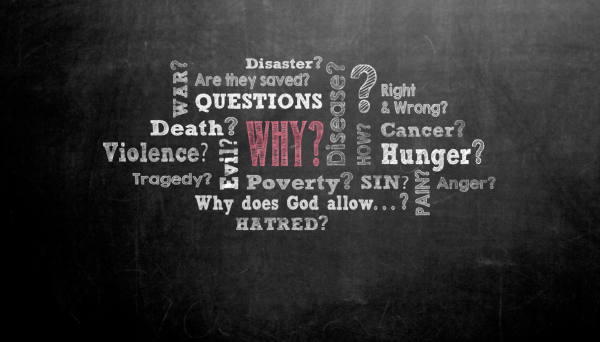In some professions, questions about love and life just come with the territory. Hairdressers and cab drivers spend a lot of time listening. So do United Methodist pastors, who often get questions after worship on a Sunday morning, from a phone call on a Tuesday afternoon, or across the table at a church dinner. Some queries are straightforward, but others are far more difficult to address. And, unlike the hairdresser and the cabbie, pastors and their congregants may feel like a clergyperson should have clear answers and advice.
To explore this topic more thoroughly, we asked a group of United Methodist pastors to share the five most challenging questions they receive.
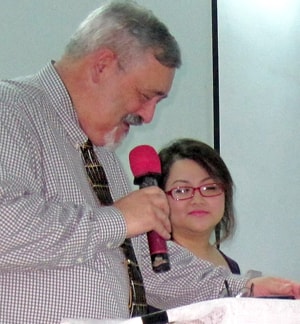
5. Out of the mouths of babes
Some of the toughest questions pastors receive come from the youngest members of their congregations.
The Rev. Dennis Crump, adjunct faculty member at Lindsey Wilson College and a United Methodist pastor in Kentucky, tells us his then 8-year-old son asked, "Can the devil get saved?"
Having a conversation about possible limitations to the grace of God with a child might seem daunting.
"After a few pensive moments and some discussion," Crump shared, "We concluded that [the devil] probably cannot get saved in the same way that we can because he has no capacity for saving faith. … However, in the mind of God, there may yet be a way?"
4. Right or wrong?
Speaking of God's grace, pastors are sometimes asked about offering grace toward those with whom we disagree. Topics in the news generate questions about responding to those with a different point of view.
The Rev. Mark Walus, a bi-vocational pastor of Monroeville (Indiana) United Methodist Church and a computer consultant, shared the story of an older teen who approached him after worship and asked: "My friend from school is gay. What should I do?"
Pastor Mark shared a quick message of grace and love, and then invited this youth to come for a deeper conversation than was possible at the door of the church.
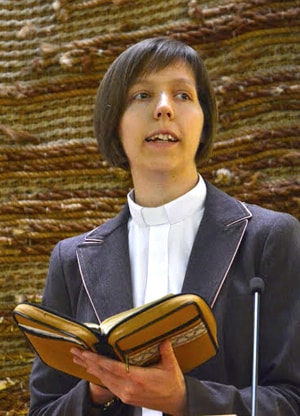
3. How can we …?
Those larger issues are often on the minds of congregants.
The Rev. Greg Milinovich, pastor of Catawissa Avenue United Methodist Church in Sunbury, Pennsylvania, says, "The hardest questions I get as a pastor are the practical how-to questions in which people are looking for easy program solutions to what are often societal, cultural, and relational problems."
When someone asks, "How can we better reach the troubled youth in our neighborhood?" he confesses he doesn't have an answer. Pastor Greg is getting more comfortable saying, "I don't know," because it offers an opportunity for the pastor and congregant to explore solutions together.
The Rev. Lilla Lakatos, who has pastored in Óbuda, Dombóvár, Szeged, and Alsózsolca, Hungary added, "I have the strong conviction that we don't need to answer all the questions. A good question can help much more than a good answer."
2. Unasked questions
Sometimes there are questions that pastors wish they were asked.
The Rev. Sharon Harris, pastor of the Hopewell, Pine Grove, and Kinder First United Methodist Churches in Louisiana, was once asked by a member of another church, "Why does my pastor preach that [Christians who do certain things are] going to hell even though they were 'once saved, always saved'?"
Pastors would rather not talk about the ministries of others but instead seize the opportunity to talk about United Methodist distinctives such as sanctification, the process of growing toward Christian perfection.
The Rev. Darryl Stephens, an adjunct professor at Garrett Evangelical Theological Seminary, is glad when questions like this surface.
"I think some of the hardest questions," Stephens continues, "are the ones pastors never get. For example, countering the rampant culture of 'everything happens for a reason' mentality that skips over the really difficult questions of theodicy," the seminary word for why bad things happen to good people.
Which leads us to the question pastors almost universally agree is the most difficult one…
1. Why?
The Rev. John Partridge, pastor at Trinity United Methodist Church of Perry Heights in Ohio, was asked, "Why do people die young?" after an untimely death in his congregation.
The Rev. Carl Chamberlain, pastor and resident theologian at Amsterdam United Methodist Church in New York, and a former spiritual care coordinator for hospice and palliative care, said the hardest questions he receives are ones like, "Why does God allow cancer, poverty, hunger, war, natural disaster, or any of the other evils we experience?"
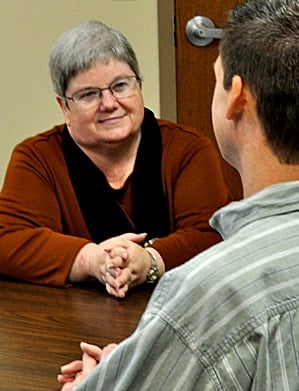
Pastor Lakatos of Hungary was asked why God wasn't answering a couple's prayers for jobs.
The Rev. Bev Hall, pastor at Pleasant Hills United Methodist Church of Ohio, told us about performing the funeral for a mother and child who died during childbirth, and being asked by the husband and father, "Why would God do this to my family?"
The Rev. Stefan Pfister, a 20-year-veteran of pastoral ministry currently serving in Davos, Switzerland, and a mentor to young pastors in Cambodia, sums it up well.
"The 'why question' is probably the most difficult one," he reports. While he longs for the proper response, he has become more comfortable saying he does not know.
While ministering to a family after a suicide, Pfister says, "I tried to answer some questions — although I know that all my explanations were just a small part of the whole reality. And this made me realize: There are no easy answers to tough questions. Many things I just do not know. I only know a very small piece of a big picture."
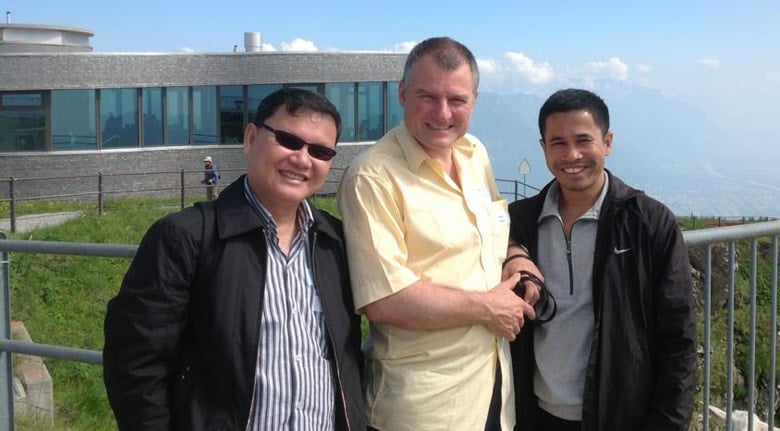
The Rev. Kerry Cameron, pastor at Four Points Rising United Methodist Parish in Burlington, Vermont agrees, "Sometimes people just need to have someone hear their pain, especially when there are no answers."
As Lilla Lakatos reminded us earlier, "A good question can help much more than a good answer." And a good person to talk with is a United Methodist pastor.
*Joe Iovino works for UMC.org at United Methodist Communications. He may be reached at [email protected] or 615.312.3733.
This story was first published on Sept. 23, 2014.

